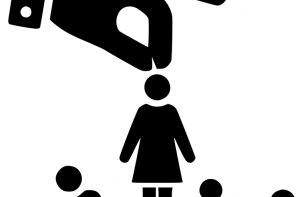“It’s Kirk. K-I-R-K. I don’t care what the rules are. I want you to type my name into that little computer of yours and look at how much money I spend in this restaurant. Then, I want you to go and find me a table.”
I looked between the angry elderly man and the out-of-date desktop monitor, and I wondered for a moment if I should bother explaining to the gentleman that this was not how the restaurant’s system worked. On a Saturday night, arguably the busiest evening of the entire week, the man demanded a table for eight people outside. He had no reservation; we were fully booked and I was not allowed to seat tables greater than six people on the terrace. Despite these difficulties, I smiled and told him that I would see what I could do.
In the three months I spent as a restaurant hostess, I discovered that people speak to service workers as if they are subhuman. I also discovered that this job was likely the most character-building experience in my life thus far —an experience, which, I argue, every person should have.
Rather, I learned a powerful lesson about the value of speaking to service workers respectfully
Diplomacy, professionalism, and the determination to perform undesirable tasks are valuable skills, ones which previous articles have recognized. Yet, I would be lying if I said that in three months I became the perfect expert in handling unreasonable clientele, or that this experience taught me something which would make an academic workload more bearable.
Rather, I learned a powerful lesson about the value of speaking to service workers respectfully. It is absolutely awful to be spoken to like you exist for the sole purpose of wiping down someone’s table and escorting them to it, and in the moments that I was snapped at (they literally snapped their fingers), yelled at, and addressed as “Hey you!” I became attuned to the serious lack of empathy inherent to too many customer-server encounters.
My own behaviours would be forever altered as a result of the annoying habits of my customers. As they acted thoughtlessly, I formed my own mental list, vowing to myself that I would never mirror them. I told myself that I would never again stay at a restaurant past closing time, chatting with friends while the staff at the back itched to leave. I could never insist that a service worker perform a specific task for me, especially once they said, “I’m sorry; I’m really not allowed.” After all, don’t the clientele follow the rules at their own jobs? I would never tell someone, “I am a paying customer,” in a restaurant, where all customers are paying customers. Most importantly, I would, from that moment on, thank an establishment’s employees for their kindness, and apologize on behalf of my less conscientious company.
Service workers are people, just like any one of us.
Service workers are people, just like any one of us. To echo the most cliché of mantras, they are people with good days and bad days. They are people with feelings and they are worthy of your respect. They might be new hostesses who cry in the bathroom after a customer calls them stupid simply because they did not like their specific table (What? Totally never happened. Don’t look at me like that).
The clienteles’ poor practices are countered by the bonds you will form with other staff, who know what it is like to be treated in this manner and empathize. Once customers have been seated and taken care of, you can share your experience with someone else, who will assure you that it was not your fault, tell you not to worry about it too much, and sometimes even encourage you to laugh it off. In these moments, united by your shared disdain for a customer’s disrespectful attitude and demeanor, you will make friends with people who you might otherwise think you have nothing in common with.
…you might find someone worth modeling your own conduct after.
So, I would advise that everyone find a job in the service industry. Maybe you will hate it, but it might just give you an attitude adjustment or newfound respect that you did not know you needed. You will form unlikely friendships, and thanks to those wonderfully kind consumers who thank employees for their service or even remember the workers’ names, you might find someone worth modeling your own conduct after.
♦♦♦
“He said he’s a very good customer and that he spends a lot of money here, so I should find him a table anyway. He said his name is Kirk. K-I-R-K,” I told the manager.
The manager stared at me blankly. “Who?”








